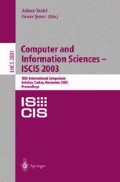Abstract
One weakness of the RED algorithm typical of routers in the current Internet is that it allows unfair bandwidth sharing when a mixture of traffic types shares a link. This unfairness is caused by the fact that, at any given time, RED imposes the same loss probability on all flows, regardless of their bandwidths.
In this paper, we propose Random Rate-Control RED (RRC-RED), a modified version of RED. RRC-RED uses per-active-flow accounting to enforce on each flow a loss rate than depends on the flow’s own rate.
This papers shows than RRC-RED provides better protection than RED and its variants to solve that problems (like FRED, CHOKe or RED-PD), and, moreover, it is easier to implement and lighter in complexity.
Access this chapter
Tax calculation will be finalised at checkout
Purchases are for personal use only
Preview
Unable to display preview. Download preview PDF.
References
Mankin, A., Ramakrishnam., K.K. (eds.): IETF Performance and Congestion Control Working Group, Gateway Congestion Control Survey, RFC 1254 (1991)
Floyd, S.: TCP and Explicit Congestion Notification. ACM Computer Communication Review 24, 10–23 (1994)
Floydy, S., Jacobson, V.: Random Early Detection Gateways for Congestion Avoidance. IEEE/ACM Transactions on Networking 1, 397–413 (1993)
May, M., Diot, C., Lyles, B.: Reasons not to Deploy RED. In: Proceedings of the IEEE/IFIP IWQoS (1999) (1999)
Lin, D., Morris, R.: Dynamics of Random Early Detection. In: Proceeding of ACM Sigcomm, pp. 127–137. ACM, New York (1997)
Pan, R., Prabhakar, B., Psounis, K.: CHOKe, A Stateless Active Queue Management Scheme for Approximating Fair Bandwidth Allocation. In: IEEE INFOCOM (2000)
Mahajan, R., Floyd, S.: RED with Preferential Dropping (RED-PD). In: Proc. ACM 9th International Conference on Network Protocols (ICNP) (2001)
Floyd, S., Fall, K.: Router mechanisms to support end-to-end congestion control. LBL Technical Report (1997)
Author information
Authors and Affiliations
Editor information
Editors and Affiliations
Rights and permissions
Copyright information
© 2003 Springer-Verlag Berlin Heidelberg
About this paper
Cite this paper
Teijeiro-Ruiz, D. et al. (2003). On Fair Bandwidth Sharing with RED. In: Yazıcı, A., Şener, C. (eds) Computer and Information Sciences - ISCIS 2003. ISCIS 2003. Lecture Notes in Computer Science, vol 2869. Springer, Berlin, Heidelberg. https://doi.org/10.1007/978-3-540-39737-3_111
Download citation
DOI: https://doi.org/10.1007/978-3-540-39737-3_111
Publisher Name: Springer, Berlin, Heidelberg
Print ISBN: 978-3-540-20409-1
Online ISBN: 978-3-540-39737-3
eBook Packages: Springer Book Archive

